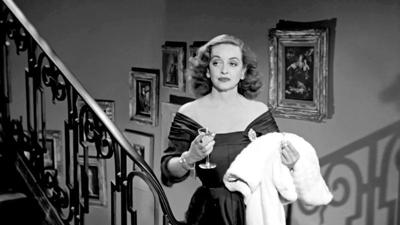Yes, I know. I’ve long said that one of the major points of this column is to talk about people who don’t get talked about very much, and Bette Davis hardly seems to qualify under those standards. However, as when I’ve written about Elvis Presley, Lucille Ball, and Ginger Rogers, I have things to talk about that aren’t just the ones everyone else discusses. Yes, she was a scintillating actress and a heck of a screen presence, but she was also a humanitarian. Most notably, she was a passionate supporter of the average soldier during World War II—and in fact was the only white member of Hattie McDaniel’s USO group.
Yes, all right, she was also a scintillating actress and a heck of a screen presence. Funnier than she’s given credit for, too; I suspect not enough people have seen The Man Who Came to Dinner, which is a fine film where she gives a light, comedic and romantic performance. She was one of the great ladies of Old Hollywood. Honestly, I think she may well be as remembered these days for her feud with Joan Crawford as much as for her acting, and that’s genuinely depressing to me. Yes, she mostly had a persona and mostly played that persona, but she was also perfectly capable of stretching herself.
And during World War II, she flung herself into war work. She actually proposed that the Academy Awards sell tickets and use the proceeds to benefit the USO or war bonds, I don’t remember which. (And the book I have that would tell me is packed somewhere.) This is apparently one of the reasons she resigned as president of the Academy; she said they wanted her to be a figurehead and not actually do anything with the role. And you can’t ask Bette Davis not to do anything with a role, after all.
She didn’t come up with the idea of the Hollywood Canteen, but she was one of its founders and one of its most passionate supporters. During World War II, she and several other important figures in Hollywood transformed a nightclub into one of the most exciting places in the country—and only those serving in the armed forces could get in. The Hollywood Canteen was staffed by the movie industry, and there’s a charming movie about it featuring Davis that I highly recommend. Davis was the one who made sure that there was at least one big-name star there every single night, and she is of course in the movie as herself.
Her personal life was difficult, not helped by a daughter who wrote a tell-all book that’s apparently not exactly the world’s most accurate. (From what I’ve read, she was mostly mad that Davis, a lifelong Democrat, wouldn’t agree to be a conservative born-again Christian instead.) She once said that her daughter’s book was as devastating as the strokes she’d suffered. She smoked a hundred cigarettes a day. She was apparently deeply in love with William Wyler, who wouldn’t leave his wife for her. She had multiple abortions in her life, and apparently even talked openly about a few of them. She was a fascinating woman as well as an incredible actress.

